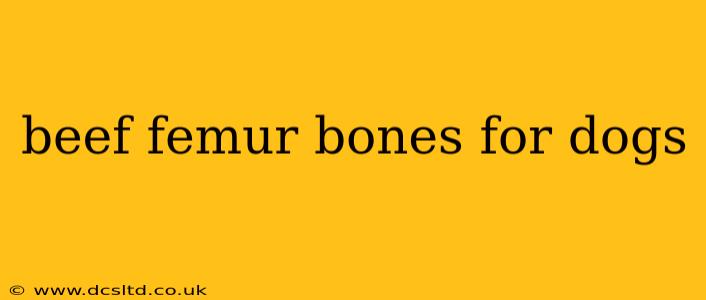Giving your dog a good chew is crucial for their dental health and overall well-being. Beef femur bones are a popular choice, but are they right for your furry friend? This comprehensive guide will delve into the benefits, risks, and everything you need to know before offering your canine companion this powerful chew.
What are Beef Femur Bones?
Beef femur bones are the large, strong thigh bones from cattle. They are significantly larger and denser than other bones often given to dogs, offering a longer-lasting and more substantial chew. Their size and density make them ideal for powerful chewers, providing a satisfying gnawing experience that helps keep teeth clean and gums healthy. They're often described as a "tough" chew, meaning they require considerable effort to break down.
Benefits of Beef Femur Bones for Dogs
- Dental Health: The act of chewing on a beef femur bone helps scrape away plaque and tartar buildup, promoting healthier teeth and gums. This natural cleaning action can reduce the risk of periodontal disease.
- Mental Stimulation: Chewing provides mental stimulation, keeping your dog occupied and preventing boredom-related destructive behaviors. The challenge of breaking down the bone can be particularly engaging for dogs that are high-energy chewers.
- Nutrient-Rich: While not a primary source of nutrition, beef bones do contain small amounts of calcium and other minerals that can contribute to your dog's overall health. However, it's important to remember that they shouldn't replace a balanced diet.
- Satisfying Chew: The size and texture of a beef femur bone provide a long-lasting and satisfying chew, keeping your dog busy and content for a considerable period.
Risks Associated with Beef Femur Bones
- Choking Hazard: Always supervise your dog while they are chewing on a bone. Large pieces can break off and pose a choking hazard, especially for smaller breeds or dogs that swallow large pieces without proper chewing.
- Tooth Damage: While chewing helps clean teeth, excessively hard bones can potentially cause tooth fractures or damage, particularly if your dog has pre-existing dental problems.
- Digestive Issues: Consuming large bone fragments can lead to digestive upset, including constipation or blockages. Monitor your dog's stool for any signs of bone fragments that aren't being properly digested.
- Bacterial Contamination: Raw bones carry the risk of bacterial contamination. Choose bones from reputable sources and ensure they are handled and stored hygienically.
Are Raw Beef Femur Bones Safe for Dogs?
The safety of raw bones is a subject of ongoing debate. Some veterinarians advocate for raw bones as a natural and beneficial addition to a dog's diet, while others express concerns about potential bacterial contamination and digestive issues. If you choose to offer raw bones, ensure they are sourced from a reputable supplier and handle them hygienically. It’s always best to consult your veterinarian before introducing raw bones to your dog's diet.
What Size Beef Femur Bone is Right for My Dog?
The appropriate size of a beef femur bone depends entirely on your dog's size, breed, and chewing strength. A large breed dog with powerful jaws will need a significantly larger bone than a small breed dog. Always choose a bone that's appropriately sized to prevent choking hazards and potential tooth damage. Never give a bone that's too large for your dog to manage.
How Often Should I Give My Dog a Beef Femur Bone?
The frequency of giving your dog a beef femur bone depends on your dog's individual needs and tolerance. Some dogs may only tolerate a bone once a week or less, while others may be able to handle them more frequently. Monitor your dog's bowel movements and overall health to determine the appropriate frequency.
Alternatives to Beef Femur Bones
If you're concerned about the risks associated with beef femur bones, there are several alternative chews available for your dog, including:
- Nylabones: Durable nylon chews designed to withstand vigorous chewing.
- Dental chews: Commercially available chews specifically designed to promote dental health.
- Other bones: Consider less dense bones like knuckle bones or smaller marrow bones.
Remember, always supervise your dog while they are chewing on any bone or chew toy, and consult your veterinarian with any concerns about your dog's dental or dietary needs. Choosing the right chew for your dog requires careful consideration of their size, breed, chewing habits, and overall health.
